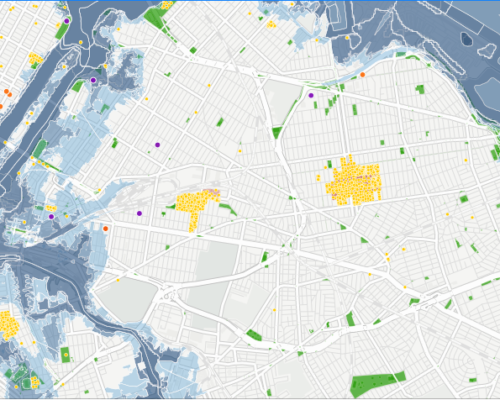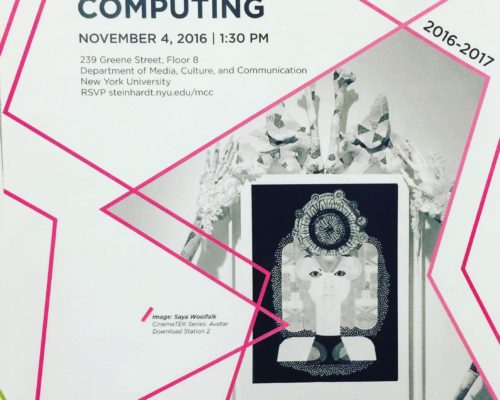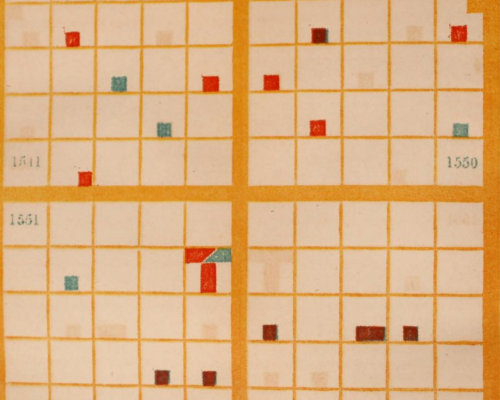On Thursday December 1st, members from the Brooklyn Public library introduced a group of interested Pratt LIS students to the prison library programs in NYC. Nick Franklin from the Brooklyn Public Library (BPL) discussed the services he and others help to provide to Rikers Island prison system, including visitation with circulating materials, reader advisory, reference services, and a video call…
Near Future Flooding and Cultural Heritage in New York City
[Click image above for link to interactive map in Carto] Digital Humanities as a field does not typically cover topics like climate change and infrastructure, as those subjects are not widely considered relevant to the “humanities” and are typically left up to work by people other than humanists. But in the past few years there has been an exponentially increasing…
NAGPRA, Cultural Heritage, and Twenty-One Years of Repatriation
Introduction In the paper she presented at the 2009 Proceedings of the Libraries in the Digital Age conference, Digital Cultural Heritage: Concepts, Projects, and Emerging Constructions of Heritage, Marija Dalbello touches on the role of both digital and physical cultural heritage in collective memory formation. She explains that “eliciting and recording public conversation about heritage today raises new questions about…
Protected: Grant Proposal: Black Publications- Interactive Map
There is no excerpt because this is a protected post.
Protected: Grant Proposal: Metal Music sub-genres Text Analysis Project
There is no excerpt because this is a protected post.
Publishing Art History Digitally: The Present and the Future
In October, the Institute of Fine Arts at New York University brought together art historians, non-profit professionals and art publishers for a symposium not only on the new phenomena of publishing traditional art historical scholarship online, but on how it relates to publishing digital humanities in art history online. Organized by the online art journal, Nineteenth-Century Art Worldwide and funded…
Research Without Borders At Columbia University. Effecting Change in Scholarly Communication: Opportunities and Costs
Abstract: Columbia University Libraries hosted a Research Without Borders Event November 21. The event focused around scholarly publishing. The speakers spoke about alternatives to traditional methods of publishing and alternatives to open source with a focus on the economy of publishing. A running theme during the event was re imagining traditional methods to publishing and open source and how authors…
“Conditions of (In)Visibility: Cultivating a Documentary Impulse in the Digital Humanities,” Keynote address by Roxanne Shirazi at Florida State University Library’s Invisible Work in the Digital Humanities Symposium, November 18th, 2016
Abstract: On November 18th, 2016, Roxanne Shirazi delivered a keynote address at Florida State University Libraries’ symposium on Invisible Work in the Digital Humanities. Her presentation, titled “Conditions of (In)Visibility: Cultivating a Documentary Impulse in the Digital Humanities,” addressed the way that focus on a final product, rather than an iterative process, obscures the labor and laborers necessary to create…
Protected: Decolonial Computing: Histories and Futures
There is no excerpt because this is a protected post.
“The Shape of History: Reimagine 19th Century Data Visualization” by Lauren Klein at Columbia University
Professor Lauren Klein of Georgia Institute of Technology conducted a talk on “The Shape of History: Reimagine 19th Century Data Visualization.” In her lecture she examines the history of data visualization through various visualization pioneers such as Elizabeth Peabody (1804-1894), William Playfair (1759-1832), Emma Willard, and Joseph Priestley. Professor Lauren Klein aimed to demonstrate the relevance of data visualization in a historical sense in today’s visualizations. Klein also discusses her own personal works with Elizabeth P. Peabody’s mural charts and the advances within her project.


